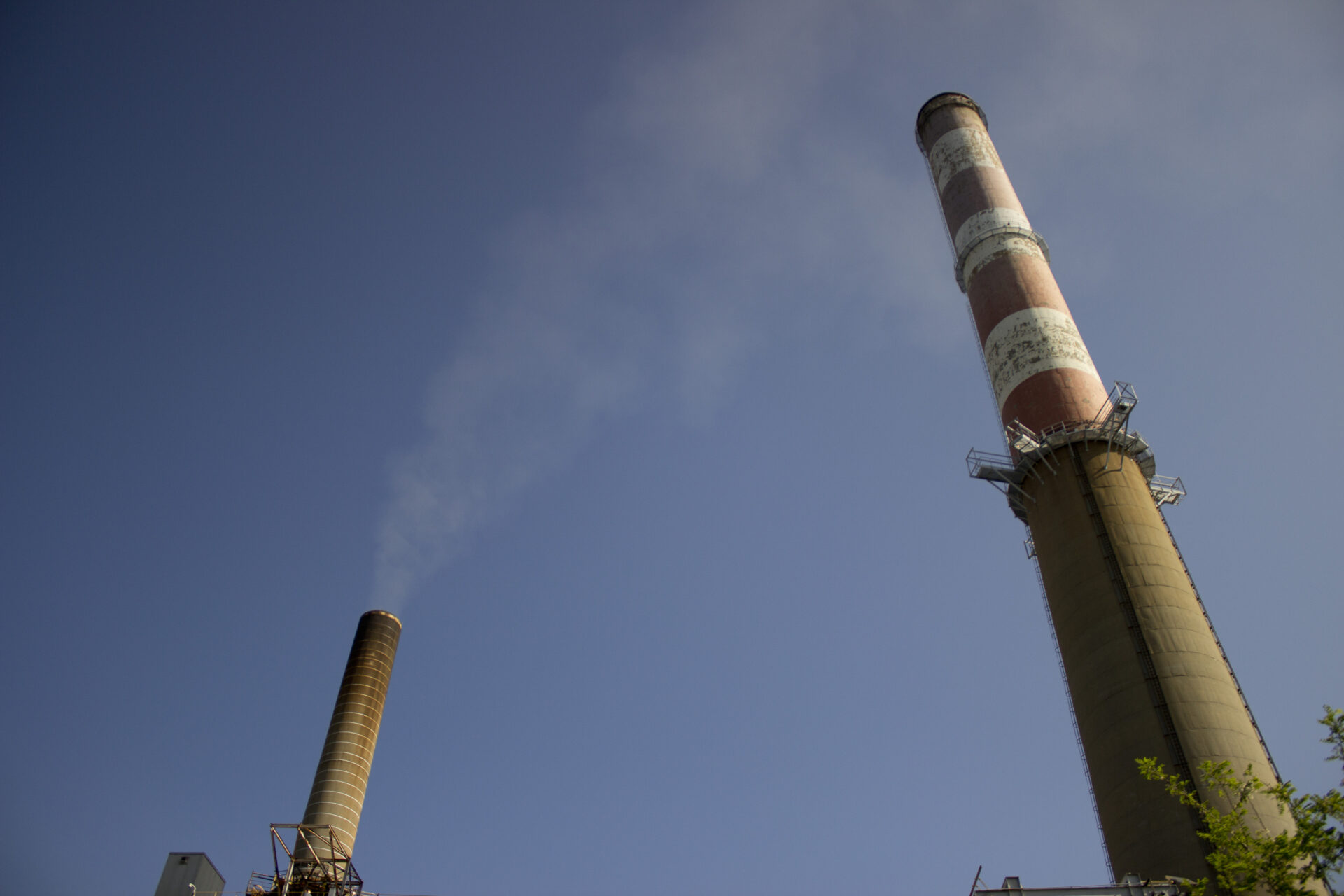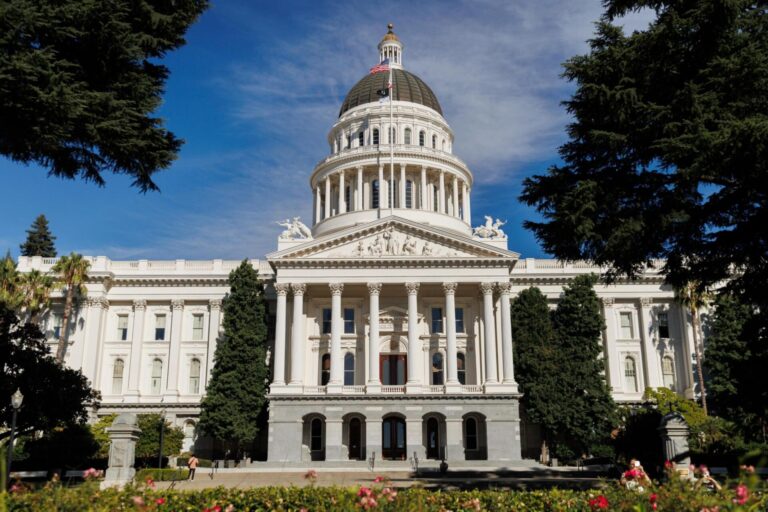Utilities and fossil fuel industry support proposed Trump administration air pollution rollbacks

Utilities, fossil fuel companies, and aligned groups filed public comments last month supporting a pair of Trump administration proposals to repeal EPA limits on harmful emissions of air pollution and greenhouse gases from power plants.
One of the Trump administration’s proposals would reverse a Biden-era EPA rule that strengthened Mercury and Air Toxics Standards (MATS), Clean Air Act regulations limiting oil- and coal-fired power plants’ emissions of hazardous air pollutants, including mercury, arsenic and lead. Under the proposed reversal, the EPA would revert to enforcing weaker standards that were previously in place, and the EPA’s tools to enforce the standards would be limited.
Another Trump proposal would repeal all greenhouse gas (GHG) emission standards for fossil fuel-fired power plants, based on the Trump administration’s proposed determination that they “do not contribute significantly to dangerous air pollution.” It also includes an alternative proposal to repeal GHG limits on existing power plants and requirements to utilize carbon capture and sequestration (CCS) at new and modified fossil fuel-fired plants, leaving in place only dramatically weakened standards for new methane gas and oil plants. Either proposal would entirely eliminate GHG regulations for coal-fired power plants.
The public comments are just the latest volley in the fossil fuel and utility industries’ long-running efforts to undermine U.S. environmental and climate standards.
The Trump administration expects to move swiftly to finalize both the GHG and MATS rule repeals in December 2025.
Utility front groups and trade associations push for deregulation
Electric utility industry groups that commented in support of the weakened federal pollution standards included the Edison Electric Institute (EEI); National Rural Electric Cooperative Association (NRECA); American Public Power Association (APPA); Alliance for Fuel Options, Reliability, and Diversity (AFFORD); Midwest Ozone Group (MOG); and Power Generators Air Coalition (PGen).
Edison Electric Institute
EEI is the trade association for U.S. investor-owned electric utilities. It has used front groups to undermine climate science and delay climate action. Utilities knew as early as the 1960s and 1970s that the climate risks of burning fossil fuels could ultimately require a transition away from fossil fuels to cleaner sources of electricity. Despite this knowledge, utilities backed misinformation campaigns to sow doubt about the causes and harmful impacts of climate change, and delay climate action. EEI previously fought the Obama-era Clean Power Plan, which sought to regulate GHG emissions from power plants for the first time in the U.S., through its backing of the Utility Air Regulatory Group.
EEI supported an earlier determination by the first Trump administration that a lowered MATS standard would be “protective of human health with an adequate margin of safety.” EEI also said that the first Trump administration’s determination was “consistent with those of the Electric Power Research Institute (EPRI) in a pair of June 2018 reports” in its comments on the MATS reversal. EPRI research is largely funded by its electric utility members, who generally pass on the cost of their EPRI dues to their customers.
Numerous medical organizations dispute the Trump administration’s adequate safety claim, including the American College of Physicians, American Lung Association and American Heart Association.
EEI also argued for looser compliance and monitoring in its MATS comments.
In its comment on the GHG rule, EEI stopped short of fully endorsing the Trump administration’s elimination of GHG regulation, instead supporting the more targeted rollback in the EPA’s alternative proposal. As part of its rationale, EEI cited case law that enables utilities to avoid federal common lawsuits where they could face liability for their climate pollution as long as the EPA retains its Clean Air Act authority to regulate GHGs. In other words, EEI wants the EPA to retain weak limits on GHG emissions from new fossil fuel plants, in part so its members can’t be sued in federal courts for their contributions to harmful climate change.
EEI also argued that CCS “has yet to be demonstrated at the levels of operation required for broad-scale deployment, and the cost of such technologies remains an additional barrier to widespread deployment.” This mirrors the argument EEI made in a 2024 lawsuit attempting to block the Biden-era GHG rule requiring CCS that Trump wants to repeal. EEI and member-utilities have long used their voluntary (and largely taxpayer and ratepayer-funded) CCS and “clean coal” research and development programs as a reason to delay transitioning from fossil fuels to cleaner power sources like wind and solar power, and list CCS among their decarbonization strategies.
National Rural Electric Cooperative Association (NRECA)
NRECA is the trade association for electric cooperatives. The organization supports the rollbacks of MATS regulations and the primary proposal to eliminate GHG regulations entirely on fossil fuel-fired power plants.
Along with EEI, NRECA previously opposed the Obama administration’s Clean Power Plan. In addition, NRECA ran a public relations campaign in 2021 to promote coal in Illinois. NRECA touts prior and current membership in front groups that regularly fight clean air standards, including the Utility Air Regulatory Group and Power Generators Air Coalition.
American Public Power Association (APPA)
APPA is the trade association for publicly-owned utilities, such as the Salt River Project in Arizona, the Los Angeles Department of Water & Power, Austin Energy, the Nebraska Public Power District, and hundreds of others.
APPA’s comments on the proposed MATS rule fully supported the rollback. Its comments on the GHG proposal, like EEI, supported the alternative proposal’s rollback, and declined to weigh in on the primary proposal beyond agreeing that a finding of significant contribution to dangerous air pollution is necessary.
APPA also previously opposed the Clean Power Plan and touted membership in the now-defunct Utility Air Regulatory Group.
Alliance for Fuel Options, Reliability, and Diversity (AFFORD)
AFFORD, previously known as the Climate Policy Group, is a trade association that bills itself as a “coalition of not-for-profit electric utilities,” though the organization does not appear to have a website and did not list its members in its comments on the proposed rules.
The group supports the repeal of Biden-era standards for MATS, arguing that coal is necessary for grid reliability, and opposes stronger regulation of the pollution-heavy fuel that might make it even more uneconomical. In its comments on the proposed GHG rule repeal, AFFORD again cites reliability as an argument for undoing regulation, ignoring the outsized costs of coal and the reliability of renewables paired with energy storage. AFFORD agrees with the primary proposal for the GHG rule and the Trump administration’s assertion that coal plants’ don’t contribute significantly to climate change, arguing that their “contribution to total global warming is negligible.”
AFFORD’s chairman is James Fuller, who is also president and CEO of MEAG Power, a generation and transmission cooperative utility in Georgia. Terry Torrens, a senior lobbyist with the Orlando Utilities Commission, is listed as a program director. Previous AFFORD leadership includes James Dickenson from JEA — the municipal utility that serves Jacksonville, Florida, Timothy Grove from Omaha Public Power, Patrick Pope from Nebraska Public Power District, and Dave Lock from the Tri-State Generation and Transmission Association, according to IRS filings.
AFFORD’s comments on the proposed GHG regulatory rollback were submitted by Robert Talley, a lobbyist whose client list includes AFFORD and MEAG, as well as several other municipal utilities and generation and transmission cooperatives, according to OpenSecrets. Of Talley’s listed utility clients, all still have active coal plants.
Midwest Ozone Group (MOG)
Midwest Ozone Group (MOG) is a front group comprised of utilities including Ameren, Duke and American Electric Power (AEP); steel and other heavy industry interests; and fossil fuel companies like ExxonMobil and Marathon Petroleum. MOG supports the complete rollback of the 2024 MATS rule and the EPA’s primary proposal to eliminate all GHG regulations for fossil fuel plants.
The group states that its primary goal is “to work with policymakers in evaluating air quality policies by encouraging sound science.” MOG previously sued the EPA to prevent the implementation of the GHG and MAT standards that the Trump administration is now pushing to repeal.
Power Generators Air Coalition (PGen)
PGen was created around late 2020 or early 2021, as the Utility Air Regulatory Group (UARG) disbanded amidst a Congressional investigation, which had for years represented utilities in litigation and regulatory opposition against EPA Clean Air Act rules. PGen is operated through the same lawyers as UARG, and many of its members are the same. PGen’s founding directors included investor-owned utilities like American Electric Power, Arizona Public Service, Consumers Energy, DTE Energy, Southern Company, and Vistra.
The group commented in support of the Trump Administration plan to repeal the MATS standards. Its comments on the proposed GHG rule endorsed the alternative proposal to eliminate most regulations if coupled with an additional weakening of the few regulations remaining.
While PGen is openly engaged in the federal regulatory process, its website states that it does not lobby or litigate. However, PGen’s lawyers are active in lawsuits through other front groups with similar membership.
PGen’s comments were written and submitted by Allison Wood and Makram Jaber, attorneys at the McGuire Woods law firm. Wood and Jaber represent a separate utility group – Electric Generators for Sensible Transition – in an earlier lawsuit seeking to block the same EPA regulations now under consideration for repeal. Wood and Jaber also represented the now-defunct UARG, which had many of the same members as PGen.
PGen, APPA, and MOG all based their GHG rule comments, particularly around the issue of CCS, on an analysis by J. Edward Cichanowicz and Michael Hein. Both Hein and Cichanowicz repeatedly served as consultants for UARG — the front-group predecessor to PGen — as early as 2004. In 2011, Cichanowicz testified to Congress that “probably 75 percent” of his income comes from utilities.
Ratepayers subsidize utility advocacy
In many states, utilities are able to embed the costs of their membership in these trade associations, typically including litigation costs, into ratepayers’ electric bills. As a result, ratepayers subsidize the network of front groups filing anti-regulation litigation and advocacy. In the case of public and non-profit power, ratepayers and taxpayers are left on the hook for APPA’s, AFFORD’s, and NRECA’s pro-pollution advocacy.
Utilities supporting climate and environmental obstruction
In addition to affiliated front groups and trade associations, some utilities themselves commented in support of rolling back pollution regulations. Ameren, American Electric Power (AEP), and Cleco all filed comments last month in support of both proposed rollbacks. Duke, Arizona Public Service (APS), and FirstEnergy commented in support of the rollback of the GHG rule.
Ameren supports looser standards in the wake of excess pollution and Clean Air Act violations, fights GHG regulation
In December, federal authorities required Ameren Missouri to spend $61 million on projects to mitigate harms from Clean Air Act violations at its now-retired Rush Island coal plant, including 14 years of sulfur dioxide emissions in excess of what the law allows. Now, Ameren Missouri joins the chorus of polluters calling for weaker monitoring and lower MATS standards for its remaining Labadie and Sioux coal plants. Ameren previously requested and received an exemption from the heightened MATS rules for its coal plants from the Trump administration.
In its comments supporting the full repeal of GHG regulations for power plants, Ameren argued that electric utilities do not “contribute significantly” to climate change. In its comments, Ameren publishes an 18-page debunking of CCS as a plausible means for reducing greenhouse-gas emissions, but continues to plan to use CCS in its sustainability reports and integrated resource plan as a justification for building out its methane gas-fired generation fleet while maintaining corporate climate targets.
Duke Energy adds to its extensive history of climate obstruction
In a January letter, Duke, along with 9 other utilities, requested that then-nominee for EPA administrator Lee Zeldin repeal the GHG regulations at issue in the current proceeding, as well as regulations related to coal ash. Duke’s comments build on its extensive history of opposing GHG regulation, though Duke does support a standard that requires new methane gas turbines to be more efficient in its comments.
Beginning in the 1990s, Duke backed disinformation campaigns that denied the science that showed human causes and harmful impacts of climate change. Since then, the utility has opposed limits and regulations on GHG emissions. This includes supporting efforts by EEI and UARG, as well as the State Policy Network and American Coalition for Clean Coal Electricity, discussed below.
The Town of Carrboro, North Carolina, last year sued Duke for its “decades-long role leading a nationwide climate deception scheme that has worsened the climate crisis, harmed the community and cost the town millions of dollars.”
Like EEI, Duke argues that CCS capturing 90% of emissions is “not adequately demonstrated” and “its costs are not reasonable.” This argument comes months after Duke’s request for $10 million from ratepayers for a feasibility study on installing CCS to curb 95% of emissions at its Edwardsport coal gasification plant was approved by the Indiana Utility Regulatory Commission.
Coal interests are also pushing regulatory rollbacks
In addition to the utility industry and its front groups, coal companies and their trade associations support the regulatory rollbacks, continuing a long history of fighting climate and environmental regulation.
As coal industry groups represent coal interests broadly, their membership can include utilities. In many cases, utilities seek to charge these membership dues to customers, forcing their ratepayers to subsidize pro-coal and anti-environmental advocacy.
America’s Power
America’s Power, formerly the American Coalition for Clean Coal Electricity (ACCCE), is a trade association that represents a coalition of industries involved in producing electricity from coal, though its membership is no longer publicly shared, and utilities fled the group under pressure from investors. America’s Power has consistently opposed regulation of coal power and its polluting byproducts, including air toxins and greenhouse gases, and has perpetuated outright climate denial. America’s Power supports both the rollback of the EPA’s MATS standards and GHG regulations.
As part of its support of the Trump administration’s rollback of GHG regulations, America’s Power insists that CCS is “not economically achievable” and “not adequately demonstrated.” This comes despite ACCCE previously touting CCS as a technology that could make coal “clean” and “control pollutants regulated by federal clean-air statutes.”
American Coal Council
The American Coal Council is another coal trade association that represents the coal industry supply chain, including mining, transportation, and coal-burning utilities like AEP, Dominion, DTE, Duke, Xcel, and the Tennessee Valley Authority. In its comments, the group encouraged the EPA to gut both the MATS and GHG regulations.
Like America’s Power and ACCCE, the American Coal Council has opposed environmental regulation and downplayed or denied the effects of climate change — it has called carbon dioxide the “environmental boogeyman of the day” and posted climate denial claiming that carbon dioxide emissions are actually advantageous. An American Coal Council communication kit for climate change and carbon dioxide provided the coal industry with a talking point: “bottom line on climate change: Coal equates to fewer deaths, lower medical costs, and more food.”
Also like America’s Power, the American Coal Council previously pointed to carbon capture and sequestration as the solution to coal’s greenhouse-gas pollution and a way to justify coal as clean. Now, however, the organization objects to requiring carbon capture as a best system for emissions reduction, arguing that the system is technologically and economically impractical.
Lignite Energy Council
The Lignite Energy Council is a regional trade association that represents North Dakota’s coal industry and its customers, like electric utilities. The Lignite Energy Council conducts pro-coal public relations campaigns and lobbies for coal-friendly legislation, including spending millions of dollars in attempts to block Minnesota clean energy policies. The group commented in support of both proposed rollbacks.
North American Coal
North American Coal, a coal mining company that “operates surface coal mines across Mississippi, Louisiana, Texas and North Dakota,” submitted comments in support of rolling back MATS regulations. North American Coal was the lead plaintiff in a lawsuit seeking to restrict the EPA’s ability to regulate greenhouse gases under the Clean Air Act. That suit was eventually consolidated with West Virginia v. EPA, which substantially limited the EPA’s authority to regulate GHG emissions from existing power plants in the Clean Power Plan.
Koch-funded right-wing groups supporting GHG regulation repeal
State Policy Network
Multiple affiliates of the State Policy Network (SPN) advocated for the elimination of GHG regulations on fossil fuel generation, including the Mackinac Center for Public Policy, Buckeye Institute, John Locke Foundation, and Texas Public Policy Foundation. SPN serves as the central hub of a network of affiliated think tanks located in all 50 states, and is funded by right-wing and corporate donors that include fossil fuel interests and petrochemical billionaire Charles Koch’s network of conservative donors.
The network has long backed opposition to clean energy and climate policies, and at the start of 2024 listed opposing renewable energy as a top legislative priority for the coming year.
Heritage Foundation
The Heritage Foundation — the primary organization behind Project 2025, the right-wing playbook for Trump to consolidate power and pursue a right-wing agenda including environmental deregulation — also commented in support of eliminating GHG regulations for electricity generation. The group has a long record of funding from the fossil fuel industry and the Koch network.
Prime Mover Institute
The Prime Mover Institute (PMI) filed comments supporting both the rollback of MATS regulations and the elimination of greenhouse-gas emission regulations for fossil fuel plants. PMI is a new think tank created and directed by Russell Greene, who is a senior fellow with the Stand Together Foundation, founded by Charles Koch. Brian Hooks, the director and CEO of Stand Together is also a director of the Charles Koch Institute and Charles Koch Foundation, according to IRS filings.
In its comments supporting the rollback of greenhouse-gas regulations, PMI relies entirely on an analysis by Always On Energy Research, the project of Isaac Orr, Mitch Rolling, and Amy Cooke. Both Rolling and Orr previously served as policy fellows at the Koch– and Lignite Energy Council-backed Center of the American Experiment, Minnesota’s SPN affiliate, where they authored and spread disinformation intended to discredit renewable energy. Cooke is the former CEO of the John Locke Foundation and Executive Vice President of the Independence Institute, both SPN affiliates. She was also part of President Trump’s 2016 EPA transition team and a visiting energy policy fellow at SPN, where she led the organization’s Energy Policy Working Group.
American Enterprise Institute
In addition, the American Enterprise Institute (AEI) — a pro-free market and anti-regulation think tank — commented in support of both proposed rollbacks. AEI has a history of climate denial, and previously offered to pay scientists to dispute climate science. The think tank has received millions of dollars from fossil-fuel interests, including the Koch network and Exxon Mobil. AEI received $550,000 between 2019 and 2020 from the foundation of Joe Craft, the CEO of coal producer Alliance Resource Partners, and a GOP and Trump donor.
Table of commenters
| Organization | Support MATS rollback | Supports repeal of GHG regulation |
| Utility Front Groups/Trade Assns | ||
| EEI | Partial | Yes |
| NRECA | Yes | Yes |
| APPA | Yes | Yes |
| AFFORD Coalition | Yes | Yes |
| Midwest Ozone Group | Yes | Yes |
| PGen | Yes | Yes |
| Utilities | ||
| Ameren | Yes | Yes |
| Duke | Yes | |
| AEP | Yes | Yes |
| APS | Yes | |
| Cleco | Yes | Yes |
| FirstEnergy | Yes | |
| Coal Interests | ||
| America’s Power | Yes | Yes |
| American Coal Council | Yes | Yes |
| Lignite Energy Council | Yes | Yes |
| North American Coal | Yes | |
| Westmoreland | Yes | Yes |
| Think Tanks | ||
| Mackinac Center | Yes | |
| Buckeye Institute | Yes | |
| John Locke Foundation | Yes | |
| TPPF | Yes | |
| Heritage Foundation | Yes | |
| Prime Mover Institute | Yes | Yes |
| American Enterprise Institute | Yes | Yes |
Photo credit: Carmen Shields on Flickr



